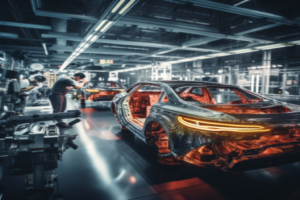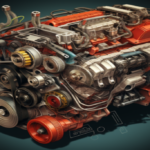Introduction:
Artificial Intelligence (AI) has emerged as a transformative force across various industries, revolutionizing the way we live and work. The automotive industry is no exception, as AI technologies are making significant inroads in vehicle design, manufacturing, driving, and maintenance. From advanced driver assistance systems to autonomous driving, AI is reshaping the automotive landscape. This article explores the profound impact of AI in the automotive industry, discussing key applications, benefits, challenges, and future prospects.
1. Advanced Driver Assistance Systems (ADAS):
AI-powered Advanced Driver Assistance Systems (ADAS) have greatly improved vehicle safety by augmenting human driving capabilities. Through the use of sensors, cameras, and AI algorithms, ADAS features include adaptive cruise control, lane-keeping assist, automatic emergency braking, and blind-spot detection. These systems enhance driver awareness, mitigate collisions, and reduce human error, making roads safer for everyone. AI algorithms analyze real-time sensor data to detect potential hazards and assist drivers in avoiding accidents.
2. Autonomous Driving:
AI plays a pivotal role in the development of autonomous driving technology, which aims to achieve fully self-driving vehicles. Self-driving cars rely on AI algorithms to process vast amounts of sensor data, including lidar, radar, and cameras, in real-time. Machine learning and deep neural networks allow autonomous vehicles to perceive and interpret the surrounding environment, recognize objects, predict behaviors, and make informed decisions. The continuous advancement of AI algorithms and sensor technologies is accelerating progress towards autonomous driving, offering the potential for enhanced mobility, reduced traffic congestion, and improved energy efficiency. However, several technical and regulatory challenges, such as handling complex scenarios and ensuring safety, remain to be addressed.
3. Natural Language Processing and Infotainment:
AI-powered natural language processing (NLP) systems enable voice recognition and speech synthesis capabilities in automobiles. Drivers can interact with their vehicles using voice commands, accessing infotainment systems, navigation services, and controlling various functions hands-free. AI algorithms facilitate language understanding, enabling vehicles to interpret and respond to driver queries accurately. Infotainment systems powered by AI provide personalized recommendations, access to streaming services, and integration with smart devices, enhancing the overall driving experience.
4. Predictive Maintenance and Telematics:
AI algorithms enable predictive maintenance in vehicles, enhancing reliability and reducing downtime. By analyzing real-time data from sensors and monitoring vehicle performance, AI can predict potential breakdowns or component failures, enabling proactive maintenance interventions. This approach minimizes unexpected repairs, optimizes maintenance schedules, and improves vehicle longevity. Furthermore, telematics systems utilize AI to gather and analyze data on driving behavior, fuel consumption, and performance metrics. This data helps fleet managers optimize operations, improve fuel efficiency, monitor driver safety, and provide personalized feedback. Telematics systems also play a crucial role in insurance assessment, allowing for usage-based insurance models.
5. Manufacturing and Supply Chain Optimization:
AI-driven automation and robotics have revolutionized automotive manufacturing processes. AI-powered robots and cobots (collaborative robots) perform repetitive tasks with precision and efficiency, leading to increased production rates and improved quality control. Machine learning algorithms enable adaptive manufacturing processes that can adjust production parameters based on real-time data, optimizing efficiency and reducing waste. AI algorithms also optimize supply chain operations, enabling real-time inventory management, demand forecasting, and intelligent logistics. By predicting demand fluctuations and optimizing delivery routes, AI helps reduce costs, minimize inventory levels, and ensure timely delivery of components, resulting in streamlined operations and enhanced customer satisfaction.
6. Challenges and Ethical Considerations:
While the impact of AI in the automotive industry is undeniable, several challenges and ethical considerations need to be addressed. Safety concerns are paramount, as the reliability and robustness of AI systems in critical driving situations must be ensured. Cybersecurity is another critical aspect, as connected vehicles are vulnerable to cyber threats. Safeguarding sensitive driver data and ensuring secure communication between vehicles and infrastructure are crucial. Additionally, addressing the ethical implications of AI decision-making, such as moral choices in autonomous vehicles, remains a complex and evolving field. Establishing guidelines and regulations that prioritize human safety, privacy, and accountability is essential.
Conclusion:
Artificial Intelligence has transformed the automotive industry, enabling vehicles to become smart and capable entities. From advanced driver assistance systems to autonomous driving capabilities, AI-driven technologies enhance safety, efficiency, and convenience. AI’s impact extends beyond driving, improving manufacturing processes, optimizing supply chains, and enhancing the overall ownership experience. However, challenges pertaining to safety, privacy, and ethics must be proactively addressed to harness the full potential of AI in the automotive sector. Collaboration between automakers, regulators, and technology developers is crucial to establishing guidelines and standards that promote responsible and beneficial integration of AI in vehicles. As AI continues to advance, the automotive industry holds tremendous opportunities for innovation and progress, ultimately leading to safer, greener, and more intelligent transportation systems. By embracing AI technologies, the automotive industry can shape a future where vehicles are not merely means of transportation but also intelligent partners that enhance our lives on and off the road.







